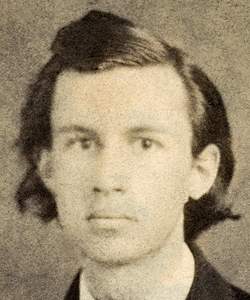Francis Sutton Livingston (Dickinson Chronicles)
Scholarship
Francis (Frank) Sutton Livingston was born in Buenos Aires, Argentina on August 3, 1838. His father was William Townsend Livingston, an American merchant who arrived in the port city in that decade and settled into business as a shipper, wool factor, and merchant on Calle Victoria. Francis Livingston's mother was Elizabeth Louisa Lord Evans, the widow of English merchant John Evans. Livingston entered Dickinson College with the class of 1861. While at the College, he was a member of the Phi Kappa Sigma fraternity and was elected to the Belles Lettres Society. Livingston did not complete his program and left to study law in Albany, New York, his father's home city.
At the outbreak of the Civil War, Livingston enlisted as a junior officer in Company A of the Fifteenth New York Engineers and served throughout the war. He was employed as a staff officer under General Henry W. Benham for much of that time. At conflict's end, Livingston joined the family business and was involved in politics as a friend and collaborator of Bartolome Mitre, president of Argentina (1862-1868) and founder of La Nacion. Livingston was himself elected as a deputy to the Argentine Congress in 1874. He also served as a colonel in the Eighty Fourth Regiment of Infantry in the political turmoil of 1889 in support of Mitre's maneuverings. Livingston prospered during the period and was a director of the Central Northern Railway and the concessionaire of the first tramway services in Buenos Aires.
Livingston married Chilean-born Eliza Gomez in February 1868, and the couple had eight sons and six daughters. The family worshipped as Livingston's parents had, at the St. John's Anglican Church in Buenos Aires. Frank Sutton Livingston died on August 28, 1915 in that city. He was seventy-seven years old.
At the outbreak of the Civil War, Livingston enlisted as a junior officer in Company A of the Fifteenth New York Engineers and served throughout the war. He was employed as a staff officer under General Henry W. Benham for much of that time. At conflict's end, Livingston joined the family business and was involved in politics as a friend and collaborator of Bartolome Mitre, president of Argentina (1862-1868) and founder of La Nacion. Livingston was himself elected as a deputy to the Argentine Congress in 1874. He also served as a colonel in the Eighty Fourth Regiment of Infantry in the political turmoil of 1889 in support of Mitre's maneuverings. Livingston prospered during the period and was a director of the Central Northern Railway and the concessionaire of the first tramway services in Buenos Aires.
Livingston married Chilean-born Eliza Gomez in February 1868, and the couple had eight sons and six daughters. The family worshipped as Livingston's parents had, at the St. John's Anglican Church in Buenos Aires. Frank Sutton Livingston died on August 28, 1915 in that city. He was seventy-seven years old.
John Osborne and James W. Gerencser, eds., “Francis Sutton Livingston,” Dickinson Chronicles, http://chronicles.dickinson.edu/encyclo/l/ed_livingstonFS.htm.



